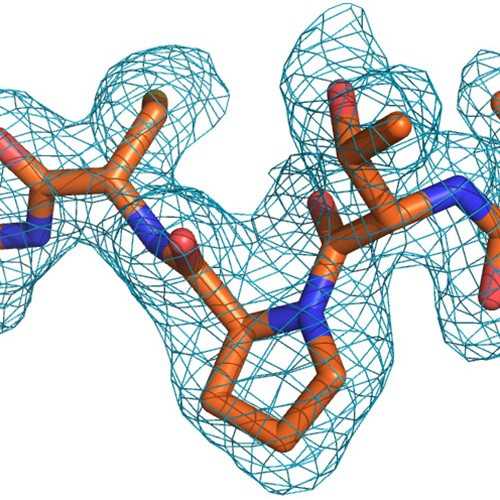Human Dipeptidase (PEPD) Protein
This full length Xaa-Pro dipeptidase (PEPD) protein was expressed recombinantly in E. coli.
Highlights:
- Amino acids 1-493
- >95% by SDS-PAGE
PEPD is commonly known as a dipeptidase important for collagen metabolism. It recycles proline and hydroxyproline which are very abundant in collagen. PEPD hydrolyzes dipeptides with C-terminal proline or hydroxyproline (e.g., glycine-proline). Mutations in the PEPD gene cause loss of enzymatic activity of PEPD protein, also known as prolidase deficiency (PD), which in turn results in elimination of high quantities of dipeptides through urine and defects in collagen metabolism. PD is a rare autosomal recessive multisystemic disease and presents with a range of clinical features, such as intractable skin ulceration, immune abnormality, recurrent infection, splenomegaly, intellectual disability, and dysmorphic features. Recently, however, several novel functions of PEPD have been discovered. Recombinant PEPD has been shown to regulate epidermal growth factor receptor (EGFR) and its family member HER2 in cancer cells. Recombinant PEPD is a ligand of EGFR and HER2. By binding to the extracellular domains of EGFR and HER2, PEPD first activate the receptors transiently and then induce their internalization and degradation, resulting in persistent depletion of the receptors and growth inhibition of cancer cells overexpressing EGFR and/or HER2 in vitro and in vivo. While intracellular PEPD does not regulate EGFR and HER2, it binds to p53 tumor suppressor and its mutants, and disrupting the PEPD-p53 complex causes activation of p53 and reactivation of p53 mutants, which results in inhibition of cancer cells in vitro and in vivo. Thus, intracellular PEPD is a potential therapeutic target for cancer treatment. Intracellular PEPD was also found to be required for expression and maturation of type 1 interferon receptor 1 (IFNAR1). PEPD regulation of EGFR, HER2, p53 and IFNAR1 are independent of its enzymatic activity. Moreover, it was also reported that intracellular PEPD plays an important role in early trafficking events during influenza A virus entry. However, the enzymatic function of PEPD appears to be important for this function.
From the laboratory of Yuesheng Zhang, MD, PhD, Virginia Commonwealth University.
This full length Xaa-Pro dipeptidase (PEPD) protein was expressed recombinantly in E. coli.
Highlights:
- Amino acids 1-493
- >95% by SDS-PAGE
PEPD is commonly known as a dipeptidase important for collagen metabolism. It recycles proline and hydroxyproline which are very abundant in collagen. PEPD hydrolyzes dipeptides with C-terminal proline or hydroxyproline (e.g., glycine-proline). Mutations in the PEPD gene cause loss of enzymatic activity of PEPD protein, also known as prolidase deficiency (PD), which in turn results in elimination of high quantities of dipeptides through urine and defects in collagen metabolism. PD is a rare autosomal recessive multisystemic disease and presents with a range of clinical features, such as intractable skin ulceration, immune abnormality, recurrent infection, splenomegaly, intellectual disability, and dysmorphic features. Recently, however, several novel functions of PEPD have been discovered. Recombinant PEPD has been shown to regulate epidermal growth factor receptor (EGFR) and its family member HER2 in cancer cells. Recombinant PEPD is a ligand of EGFR and HER2. By binding to the extracellular domains of EGFR and HER2, PEPD first activate the receptors transiently and then induce their internalization and degradation, resulting in persistent depletion of the receptors and growth inhibition of cancer cells overexpressing EGFR and/or HER2 in vitro and in vivo. While intracellular PEPD does not regulate EGFR and HER2, it binds to p53 tumor suppressor and its mutants, and disrupting the PEPD-p53 complex causes activation of p53 and reactivation of p53 mutants, which results in inhibition of cancer cells in vitro and in vivo. Thus, intracellular PEPD is a potential therapeutic target for cancer treatment. Intracellular PEPD was also found to be required for expression and maturation of type 1 interferon receptor 1 (IFNAR1). PEPD regulation of EGFR, HER2, p53 and IFNAR1 are independent of its enzymatic activity. Moreover, it was also reported that intracellular PEPD plays an important role in early trafficking events during influenza A virus entry. However, the enzymatic function of PEPD appears to be important for this function.
From the laboratory of Yuesheng Zhang, MD, PhD, Virginia Commonwealth University.
| Product Type: | Protein |
| Name: | Xaa-Pro dipeptidase (PEPD) G278D |
| Alternative Name(s): | X-Pro dipeptidase, Imidodipeptidase, Peptidase D, Proline dipeptidase, Prolidase |
| Accession ID: | P12955 |
| Source: | E. coli |
| Molecular Weight: | 55,613.3 Da (with his tag) |
| Amino Acid Sequence: | Amino acids 1-493 |
| Fusion Tag(s): | C-Terminal His-tag |
| Purity: | >95% by SDS-PAGE |
| Buffer: | PBS (no preservative) |
| Concentration: | 1mg/mL |
| Comments: | Homodimer |
| Storage: | 4C for up to 2 days, -20C or -80C for long term |
| Shipped: | Dry ice |
- Front Mol Biosci 8, 723003, 2021
- FEBS J 284, 2870-2885, 2017
- JBC 288, 2365-2375, 2013
- EBioMedicine 2, 396-405, 2015
- Sci Transl Med 11, eaav1620, 2019
- Nat Commun 8, 2052, 2017
- Commun Biol 4, 1373, 2021
- Cell Host & Microbe 18, 61-74, 2015
- J Virol 88, 11271-11283, 2014
If you publish research with this product, please let us know so we can cite your paper.


